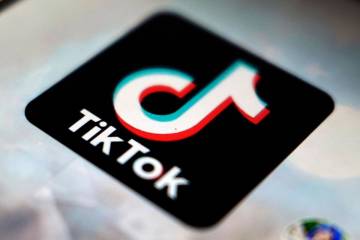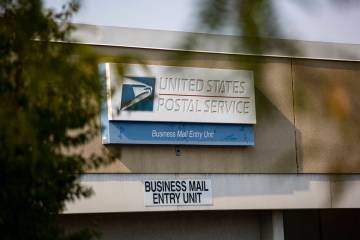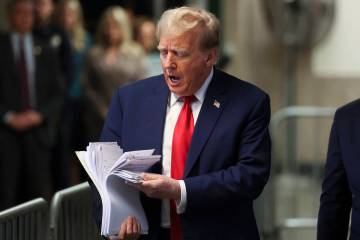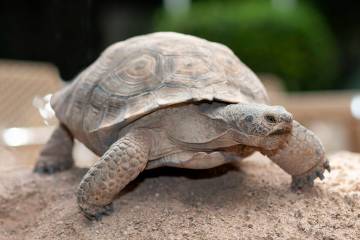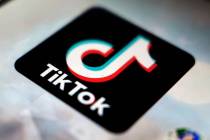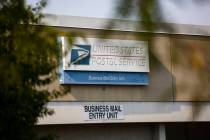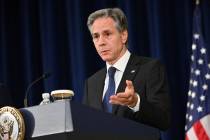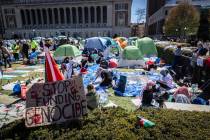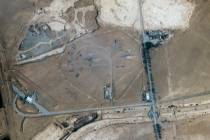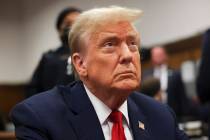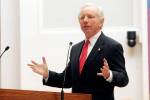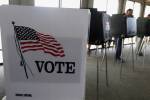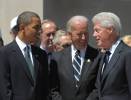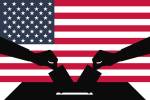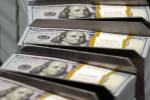Obama swept away Nevada
Barack Obama won Nevada on Tuesday because he crushed his opponent in the state's urban counties and didn't get killed in the rural areas of the state.
The Democrat who will be America's next president dramatically increased Hispanic and black turnout. He beat Republican John McCain among those groups by 4-to-1 and nearly 20-to-1 margins, respectively, enough to offset a loss among the white majority of the state's electorate, according to news organizations' exit polls of the state.
In the course of his dramatic 12-percentage point victory in Nevada, Obama dominated among first-time voters, though he didn't draw a larger than usual amount of them to the polls. But Obama also won a majority of those who had voted before.
The Democratic victory came in a state twice won narrowly by President Bush and helped carry Democrats further down the ticket to wins in races for Congress and the state Legislature.
"This was such a significant victory. I hope people recognize and accept that most Americans really wanted this," former Nevada Gov. Bob Miller, the last Democrat to hold that office, said Wednesday. "It was an extraordinary night for Democrats in the sense of the public mood for change and the message President-elect Obama has captured."
Miller had friendly bets going with local and national political operatives he knows. His money was on a 5-point victory for Obama in Nevada.
"I was surprised by the margin," he said.
Turning Nevada from a barely red state to an unequivocally blue state was the result of several factors, Miller and other political observers said in analyzing Tuesday's fallout.
The deep unpopularity of Bush and the Republican Party laid the groundwork, while the nose dive of an already faltering economy just a month before the election, a blow that hit Nevada especially hard, increased the urgency of appeals for a new direction.
Sixty-three percent of those surveyed told exit pollsters the economy was the issue they considered most important, and three in five of them were Obama voters.
At the same time, demographic trends in Nevada and the West have been pushing the state's electorate in directions that generally favor Democrats, including more Hispanics, whose participation in this year's vote was a 60 percent increase from four years ago in the state; growing populations in the urban and suburban areas as the rural areas' share of the vote declines.
"These trends have been brewing for the past couple of (election) cycles in the intermountain West, and this was the year they finally broke through," said Andrew Myers of Myers Research, a Democratic pollster who collected data for a national initiative the Democratic Party dubbed Project New West.
Democrats won all three Western swing states in this election: Nevada, Colorado and New Mexico. Combined, they represented 19 electoral votes, almost equivalent to Ohio, which has 20.
The Democrats began the major push for the West two years ago. It was the reason the Democratic National Committee put August's national convention in Denver and, before that, the January caucuses in Nevada, which drew nearly 120,000 Democratic participants.
Republicans mostly watched passively as this happened, arguing that the basic instincts of the region that spawned Barry Goldwater remained essentially conservative, devoted to low taxes and small government.
But Democrats began tailoring their message for Western voters, talking more about issues like public lands, the economics of energy and the concerns of rural residents.
"Throughout the West, we made sure that our candidates running for office were people who were problem solvers, people who were not ideologues, people who put the public service over the power quest, which seems to have been the Republican creed for many years," U.S. Sen. Ken Salazar, D-Colo., said in a Wednesday conference call about the success of the Democrats' Western strategy.
"Western voters, we all know, reject extreme political ideologues and ideologies and choose leaders with common sense solutions for the unique challenges of the American West," said Senate Majority Leader Harry Reid, D-Nev.
So confident were Democrats that the strategy would pan out that the conference call was scheduled Sunday afternoon to take place the day after the election.
"What we saw in Nevada last night was more than coattails," Reid said. "This election was a clear call for change. I'm also proud of our fantastic organization in Nevada. I'm boasting, but it's true."
Dovetailing with the party's groundwork was the Obama campaign's organizational might -- nationally, it has been called the most impressive political machine in a generation or more -- and a resurgent, cash-flush Democratic party locally and nationally. In Nevada, Democrats capitalized on trends and money to turn a state that in 2004 had 5,000 more Republicans than Democrats on the voter rolls to one that this year had 110,000 more Democrats.
Meanwhile, "the Republican Party is in disarray," said Eric Herzik, political science department chairman at the University of Nevada, Reno.
Not everything went the Democrats' way. Republican Rep. Dean Heller beat back a challenge from Democrat Jill Derby in the rural and Northern Nevada 2nd Congressional District, even winning Washoe County despite Obama's 12-point victory there.
Democrats got the two big wins they wanted in the state Senate, taking control of both houses of the Legislature, but they picked up just one seat in the state Assembly out of five that were seen as possibilities.
Even successful candidates like the two Democrats who won County Commission open seats, Larry Brown and Steve Sisolak, and state Sen. Dina Titus, who ousted Rep. Jon Porter, underperformed Obama in their districts.
Euphoric Democrats look at the West and see a historic political realignment. Given the demographics and the precedent set by this election, they contend, it is only a matter of time until the region is as solidly Democratic as the South is now solidly Republican.
In particular, they point to the growing Hispanic electorate. Just 10 percent of Nevada voters in 2004, Hispanics were 16 percent on Tuesday. And while 60 percent of them chose Democrat John Kerry over Bush four years ago, 78 percent went for Obama this year, the largest share of the Hispanic vote for the Democrat in all states.
Hispanics have embraced civic participation like never before at the same time as they have turned against the Republican Party, largely because of the 2006 immigration controversy, said Andres Ramirez, vice president for Hispanic programs at the liberal think tank NDN.
If Democrats don't blow it by ignoring Hispanics' concerns, states like Arizona and even Texas could be in play for future national campaigns, Ramirez said.
Myers, the Democratic pollster, said looking at the Western states, where Democrats have gone from zero to eight governorships in four years, it's hard not to see a shift.
"The region remains competitive in 2010," he said. "It's maybe a little less so, leaning to the Democrats, in 2012. You start to get beyond there, and we're likely to own it like the Republicans own the South."
Nevada Republican consultant Ryan Erwin said it's more likely the Democrats are enjoying the upside of a naturally cyclical process.
"Anybody who suggests that this is not a libertarian conservative state overall is probably mistaken," Erwin said. "It's not so much a shift in ideology as a disgust with the short term problems of the Republican Party and the fiscal direction of the country. ... We have shifted a little bit, but this is not Massachusetts yet."
Political scientist Herzik, himself a Republican irked by what he sees as the party's floundering, said the situation for the GOP in Nevada is likely to get worse before it gets better as the party -- divided, confused and in denial -- fights over its future.
But Herzik said the Democrats' bluster smacks of dangerous hubris.
"The Democrats are talking realignment," he said. "We'll see in 2010 when Barack Obama's name is not on the ballot. Will these new voters and these minority voters turn out for Harry Reid at the same level, with the same enthusiasm, as they did for Barack Obama? That remains to be seen."
Contact reporter Molly Ball at mball@reviewjournal.com or 702-387-2919.





